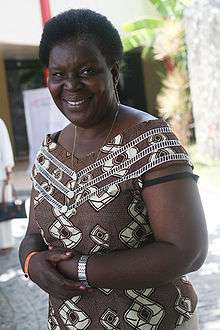Paulina Chiziane
Paulina "Poulli" Chiziane (born 4 June 1955, Manjacaze, southern province of Gaza, Mozambique) is an author of novels and short stories in the Portuguese language.[1][2] She studied at Eduardo Mondlane University, Maputo. She was born to a Protestant family that moved from Gaza to the capital Maputo (then Lourenço Marques) during the writer's early childhood. At home she spoke Chopi and Ronga.
Paulina Chiziane | |
|---|---|
 | |
| Born | 4 June 1955 Manjacaze, Gaza, Mozambique |
| Period | Post-modernism |
| Genre | Novel, Short stories |
| Notable works | Sétimo juramento |
| Notable awards | Prémio José Craveirinha de Literatura (2003) |
Chiziane was the first woman in Mozambique to publish a novel.[3] Her writing has generated some polemical discussions about social issues, such as the practice of polygamy in the country. For example, her first novel, Balada do Amor ao Vento (1990), discusses polygamy in southern Mozambique during the colonial period. Related to her active involvement in the politics of Frelimo (Liberation Front of Mozambique), her narrative often reflects the social uneasiness of a country ravaged and divided by the war of liberation and the civil conflicts that followed independence. Her novel Niketche: Uma História de Poligamia won the José Craveirinha Prize in 2003.[4]
Interpretation
Chiziane's writing has often been defined as political and feminist. Writing for this author is a mission. It is a way to express the difficulties that women encounter when faced with the heterogeneity of Mozambican cultural traditions and the newly developed legal and administrative systems. Chiziane's writing addresses regional differences in cultural and political aspects of gender relations. In her novel Niketche, for instance, she depicts the Mozambican South as dominated by a patriarchal culture, whereas the North is shaped by traditions of matriarchal rule. She also alludes to the fact that Frelimo itself assumed an ambiguous attitude with regard to polygamy, making it illegal at first, but then tolerating its continuing practice. Throughout her work, Chiziane's attention has focused on broad social issues related to women's rights and concerns, such as monogamy and polygamy, but also on subjective and intimate relationships between individual men and women. Chiziane has stated that, in accordance with the tradition of her land, she considers herself a storyteller rather than a novelist.
In 2016, she announced that she was retiring from writing.[5]
Novels
- Balada de Amor ao Vento (1990), ISBN 978-972-21-1557-5
- Ventos do Apocalipse (1996), ISBN 972-21-1262-7
- O Setimo Juramento (2000), ISBN 972-21-1329-1
- Niketche: Uma História de Poligamia (2002) - Companhia das Letras, ISBN 85-359-0471-9
- O Alegre Canto da Perdiz (2008) - Caminho, ISBN 978-972-21-1976-4.
References
- "Paulina Chiziane, escritora moçambicana". TSF (in Portuguese). 16 July 2003. Archived from the original on 16 July 2012. Retrieved 8 November 2010.
- Kortenaar, Neil Ten (2009). The changing face of African literature (in French). Rodopi. pp. 177ff. ISBN 978-90-420-2580-6. Retrieved 8 November 2010.
- Perdigao, Yovanka Paquete (22 December 2015). "Say What! Where are the Black writers from Portuguese Africa?". Afrikult. Retrieved 28 October 2017.
- Fitzpatrick, Mary (2007). Mozambique. Lonely Planet. p. 34. ISBN 978-1-74059-188-1. Retrieved 8 November 2010.
- "Entretenimento - Famosos, Humor, Eventos e Cinema - MMO". Moçambique Media Online. Retrieved 28 January 2018.